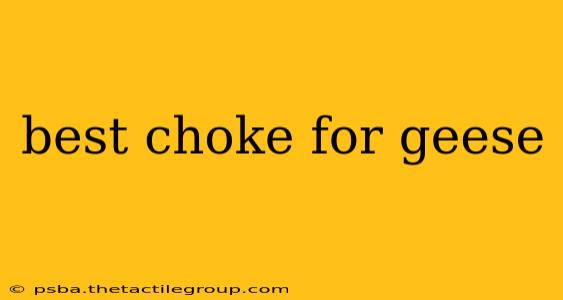Choosing the right choke tube is crucial for successful goose hunting. The powerful recoil of a shotgun, combined with the need for consistent patterns at long ranges, makes selecting the appropriate choke a critical aspect of your strategy. This guide will delve into the best choke choices for goose hunting, exploring various options and helping you make an informed decision.
Understanding Choke Tubes and Their Impact on Goose Hunting
Before diving into specific choke recommendations, it's vital to understand how choke tubes affect shot patterns. Choke tubes constrict the barrel's end, influencing the spread of your shot. A tighter choke creates a denser pattern, ideal for longer ranges, while a more open choke produces a wider spread, better suited for closer shots. Goose hunting often demands a balance, as geese can appear at varying distances.
Key Considerations When Choosing a Choke for Geese:
-
Shot Size: The shot size you use significantly influences choke selection. Larger shot sizes (like BB or T) require less constriction to maintain effective patterns at longer ranges. Smaller shot sizes will need tighter chokes.
-
Hunting Distance: Are you primarily hunting geese in close proximity or at longer ranges? Longer distances necessitate tighter chokes for better pattern density.
-
Shotgun Type: Different shotguns may perform differently with various choke tubes. Consult your shotgun's manufacturer's specifications for compatible choke types and recommendations.
-
Ammunition Type: Steel shot, often required for waterfowl hunting, patterns differently than lead. Steel shot may require a more open choke to achieve comparable patterns to lead at the same distance.
Best Choke Options for Goose Hunting
While there's no single "best" choke for every goose hunting scenario, some options consistently perform well:
1. Modified Choke: The Versatile Choice
The modified choke strikes a balance between pattern density and spread. It offers sufficient range for most goose hunting situations while still providing a reasonable pattern size for slightly closer shots. This makes it a highly versatile option for hunters who encounter geese at varying distances. It's a great all-around choice for many hunters and a solid starting point.
2. Improved Cylinder Choke: For Close-Range Encounters
The improved cylinder choke provides the widest shot pattern. It's ideal for very close-range shots where a tight pattern isn't necessary. However, its effectiveness drops significantly at longer distances, making it unsuitable for most goose hunting scenarios unless you're consistently hunting in very close proximity.
3. Full Choke: Maximizing Range
The full choke delivers the tightest pattern, ideal for long-range shots. This is excellent for those experienced hunters who consistently engage geese at significant distances. However, using a full choke at close ranges may result in too concentrated a pattern, potentially leading to missed shots due to insufficient pellet spread.
4. Extra-Full Choke: A Specialized Option
An extra-full choke provides an even tighter pattern than a full choke, maximizing range but further sacrificing pattern size. It's a highly specialized choke, best suited for extremely long shots and hunters with exceptional accuracy and skill. It's generally not recommended for beginners or those who frequently hunt geese at closer ranges.
Beyond the Basics: Understanding Your Equipment
Remember that the performance of your choke tube is also affected by the quality of your shotgun, the type of ammunition used, and your shooting skills. Experimentation is key to finding the optimal choke for your individual hunting style and conditions.
Conclusion: Finding Your Perfect Fit
Selecting the best choke for goose hunting involves considering several factors: shot size, hunting distance, shotgun type, and your personal shooting style. While the modified choke serves as a versatile and reliable option for many hunters, understanding the nuances of other chokes allows you to fine-tune your approach for optimal performance. Ultimately, the best way to determine the ideal choke for your needs is through field testing and observation. Remember to always practice safe gun handling and follow all relevant hunting regulations.

